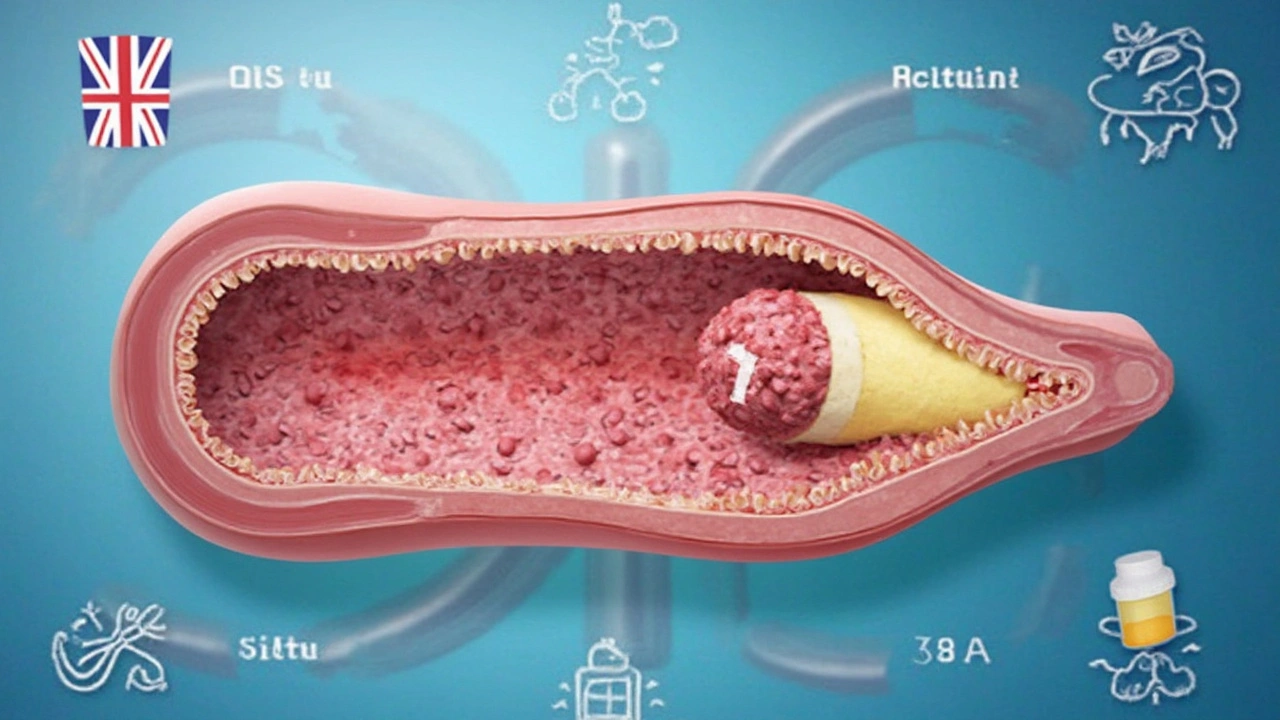Ever notice how cholesterol barely crosses your mind, right up until your doctor starts listing your test results? That sinking feeling hits when numbers don't quite land where they should. Enter Zocor, or simvastatin, one of the world’s most prescribed cholesterol medications. Stories about statins fly around at every backyard barbecue, physician’s office, and lunchroom, but what’s actually true about Zocor? Is it the cholesterol savior or just another pill with a laundry list of warnings? Let’s cut the noise and get into what matters.
How Zocor Works in Your Body
The science behind Zocor isn’t rocket science, but it’s still pretty neat. When you swallow that little tablet, you’re taking a statin—the medical term for drugs that slow down cholesterol production in the liver. The magic trick? Zocor blocks an enzyme called HMG-CoA reductase, which the liver uses to make cholesterol. When that process hits a speed bump, your liver starts pulling ‘bad’ LDL cholesterol from the bloodstream instead.
But there’s more. Think about cholesterol like traffic on a highway. Too much, and you’ve got a pile-up—except the traffic jam is inside your arteries, slowly hardening and clogging them with plaque. This is the heart of heart disease (no pun intended). Zocor’s not just lowering the overall pile-up; by targeting LDL, it cuts down on the worst drivers, leaving the ‘good’ HDL cholesterol free to clean up behind them. Most people on Zocor see their LDL drop by up to 40%, sometimes more with higher doses.
Some folks ask: If cholesterol is so bad, why does the body make it in the first place? Turns out, your cells need cholesterol to keep their walls sturdy, make certain hormones, and help with vitamin D production. The trick is in the balance. Zocor doesn’t try to wipe out cholesterol; it just keeps the bad stuff in check before it wrecks the place.
Doctors typically prescribe Zocor to those who already have high cholesterol or who have a significant risk for heart attack, stroke, or other problems tied to hardening arteries. If your doctor says you need medicine, it usually means diet and exercise alone haven’t gotten you out of the danger zone. Still, Zocor isn’t a golden ticket—you’ll keep hearing about salads and walking shoes because they matter just as much.
Benefits and Risks: What Users Really Experience
Let’s set the record straight: Most people don’t feel any different after starting Zocor. No energy spike, no outburst of happiness, no sudden cravings for kale. That’s because Zocor is fighting a silent battle inside your blood vessels, not giving you a buzz. But the benefits show up big time on paper. On average, patients see a 20–40% drop in LDL cholesterol and a 10–15% bump in HDL—the so-called ‘good’ cholesterol. Triglycerides? Those often fall by 10–30% as well.
The real magic comes over time. Studies, like the famous Scandinavian Simvastatin Survival Study, proved Zocor could lower the risk of fatal heart attack by about 30% over five years in people with heart disease. Not impressed? In plain numbers, for every 100 similar patients taking Zocor, three major events get sidestepped—stroke, heart attack, or death—that otherwise would have happened. Those numbers matter if you’ve already got heart disease or high cholesterol running in the family.
Now, as with any pill, it isn’t all sunshine and better lab reports. Most people tolerate Zocor just fine, but there are some common side effects: muscle aches, mild stomach pain, and the occasional headache top the list. Rarely—less than 1%—someone might get muscle breakdown or serious liver trouble. Doctors keep tabs on your liver enzymes and muscle symptoms for good reason. The risk goes up when Zocor is mixed with other specific medications, grapefruit juice, or taken at very high doses.
It’s easy to miss doses or slack off because you can’t feel it working. Skipping Zocor here and there isn’t the end of the world, but if you make a habit of it, your numbers will creep back up—and so does your risk. Handling Zocor like any other daily must-do (like coffee) works best: take it at the same time every day, usually at night, since the liver’s most active making cholesterol while you sleep.
Here's a breakdown of the numbers on common benefits and side effects, using trusted clinical data:
| Effect | Percentage of Users Affected |
|---|---|
| LDL Cholesterol Reduction | 20-40% |
| HDL Cholesterol Increase | 10-15% |
| Triglyceride Reduction | 10-30% |
| Muscle Pain (Mild) | 2-4% |
| Liver Enzyme Increase | 1-2% |
| Severe Side Effects (e.g., Rhabdomyolysis) | <1% |

Smart Tips for Using Zocor Safely
Taking Zocor isn’t as simple as popping a vitamin. There are little tweaks and hacks for getting the best results without running into trouble. First, if your doctor says take it at night, stick to that routine—the liver turns into a cholesterol-making machine while you sleep, so Zocor works best then. Set a daily reminder or link the pill to a habit you never skip, like brushing your teeth before bed.
Grapefruit juice may sound harmless, but it messes up the way Zocor is broken down. Drinking grapefruit juice can actually raise your risk of side effects, especially for muscle problems, so it’s better to steer clear. Don’t try to sneak in fresh grapefruit either—results are the same.
If you’re into supplements, keep an eye on anything with niacin or red yeast rice. Both can interact with statins and make muscle side effects more likely. Same goes for big changes in your exercise routine: suddenly running marathons after years on the couch? Tell your doctor. Major jumps in activity plus Zocor can trigger aches you don’t want.
Stay alert for muscle pain that doesn’t go away, or dark-colored urine. These could mean a rare but serious muscle breakdown. If you ever feel unusual weakness, especially with a fever or feeling out of sorts, call your doctor right away. Luckily, these issues are rare, but catching them fast is better.
Don’t forget, Zocor can quietly mess with blood sugar levels too. If you’re already dealing with cholesterol medication, especially with other health problems like diabetes, regular blood tests are key. They’ll check your cholesterol, liver, and blood sugar, usually every few months at first, then maybe twice a year. Don’t dread these visits—they’re how your doctor catches problems before they catch you.
If you ever miss a dose, just skip it and pick up as usual the next day. Double-dosing does more harm than good. Keep your medications in one spot and consider a pill box if you find yourself forgetting.
Traveling? Pack your Zocor and a list of your meds just in case your bag gets lost or you run out. It sounds simple, but being prepared saves the headache of tracking down a prescription in a strange place, especially abroad.
If you read horror stories online, remember that everyone’s body is unique. The majority do well with minimal fuss, so don’t quit or change your dose without checking in with your doc. Open, honest conversations are your best safety net.
Living Well with Zocor: Beyond the Pill Bottle
Zocor isn’t an excuse to ignore exercise or eat anything you want—if only, right? The most powerful results show up when medicine and lifestyle team up. Try this: swap red meats for fish or chicken twice a week. Add a handful of nuts to your snack list instead of chips. These small tweaks stack up fast for heart health.
The American Heart Association swears by 150 minutes of moderate exercise a week. That’s just five half-hour walks. The boost to your HDL cholesterol, lower blood pressure, and improved mental health all add up. Some folks even find their doctor can cut their Zocor dose after a few months of healthier living.
Smoking and drinking? Both can mess with your heart and your cholesterol levels. Every day you smoke is a day stacking up the dangers Zocor is trying to fight off. If quitting feels impossible, talk to your doctor about strategies or programs to help. As for alcohol, moderation is the word—one drink a day for women, two for men, max. More than that can bump liver trouble higher on the risk list.
Don’t ignore stress, either. Your body loves to spike cholesterol and blood pressure under long stretches of tension. A few minutes a day of mindfulness, yoga, or even just listening to your favorite music can bring levels down. Good sleep matters too: your body uses that downtime for repair, and poor sleep has been linked to higher cholesterol.
Energy and mood can feel all over the map when you’re dealing with new meds and diagnoses. Support groups—online or in person—help more than you’d guess. Sharing success (and frustration) makes the routine less lonely and helps you pick up new tips.
Zocor can seem invisible, but it’s changing your future, cutting your risk of heart attacks and strokes you may never see coming. Pair solid habits with smart pill management, and you’re giving yourself a much better shot at health. Every small step counts, even if you only feel the difference years down the road.






Reviews
Zocor saved my life after my first heart scare. I was skeptical at first-thought it was just Big Pharma pushing pills-but my LDL dropped 38% in three months, and I’ve had zero side effects. I take it with dinner, no grapefruit, and walk 45 mins every evening. Simple stuff, but it works.
Doctors don’t talk enough about how lifestyle and meds work together. You can’t out-supplement a bad diet, but you also can’t just ‘eat clean’ and expect your genetics to bend.
Been on it for 7 years. Still alive. Still working. Still not perfect, but better than the alternative.
Of course you’re praising statins. You probably also believe in fluoride in the water and that vaccines don’t cause autism. The pharmaceutical industry funds every ‘study’ you cite. Zocor is just a chemical crutch for people too lazy to eat real food.
I’ve never taken a statin in my life. My cholesterol? Perfect. Because I eat meat, butter, and eggs-and I don’t care what your lab results say.
LMAO Alex, you’re the reason people hate doctors. You think your ‘butter diet’ is some kind of ancestral magic? Your LDL is probably 220 and you’re just too proud to get tested.
And yeah, Zocor’s not a vitamin. But neither is insulin. Or blood pressure meds. Or antibiotics. You wanna live like a caveman? Fine. But don’t act like your cholesterol is sacred when your dad had a stroke at 52.
Also-grapefruit juice is bad with Zocor? Shocking. Next you’ll tell me smoking causes cancer.
I’ve been on simvastatin for 9 years. My biggest tip? Don’t wait until you’re terrified to start. My mom waited until she had chest pain-and then she was scared to take anything. It took months to get her on track.
My doctor said, ‘It’s not about how you feel. It’s about what’s happening inside.’ And he was right. I don’t feel different. But my arteries? They’re cleaner now than they were at 35.
Also, yes-take it at night. I set a phone alarm labeled ‘Cholesterol Ninja Mode.’ It’s weird, but it works.
People forget that cholesterol isn't evil-it's a building block. The body doesn't make it to hurt you. It makes it to keep you alive. Zocor doesn't destroy cholesterol, it just nudges the balance.
And yeah, muscle pain happens-but it's not the end of the world. I had it for two weeks, switched to a lower dose, and now I'm fine. The fear around statins is way bigger than the risk.
Also, if you think diet alone fixes everything, you've never met someone with familial hypercholesterolemia. That's not a lifestyle problem. That's a genetic bomb.
Also also-sleep matters. I started sleeping 7+ hours and my triglycerides dropped 20% without changing anything else. Mind blown.
What’s the actual long-term data on Zocor beyond 10 years? I’ve seen studies up to 5, but what about 15? 20? Are we just assuming it stays safe? Also, does it affect cognitive function long-term? I’ve heard mixed things.
And why is the dosage so rigid? Why not titrate based on genetics or liver metabolism? Seems like we’re still using 1990s protocols for a 2020s body.
Interesting how Western medicine pushes pills while ignoring Ayurveda. In India, we’ve used fenugreek, turmeric, and garlic for centuries to balance cholesterol. No pills. No side effects. Just real food and ancient wisdom.
Now you come here with your Zocor and your ‘science’ like it’s the only truth. Tell me, how many Indian patients on statins have kidney failure or muscle necrosis? You don’t see that in our villages.
Maybe the problem isn’t cholesterol. Maybe it’s your diet full of processed wheat and sugar. But sure, keep blaming the liver.
Let’s be clear: the entire statin industry is a financial racket. The FDA approved simvastatin based on flawed trials funded by Merck. The ‘30% reduction in heart attacks’ statistic? It’s relative risk. Absolute risk reduction? 1.5%. That’s one person saved per 67 patients for five years.
Meanwhile, the side effects-muscle damage, diabetes risk, cognitive fog-are systematically downplayed. And you think this is medicine? It’s corporate profit dressed in white coats.
Also, why is grapefruit juice singled out? Because it’s natural. They don’t want you to think food can interfere with their patented chemicals. It’s all about control.
There’s a deeper truth here that nobody wants to say: we’ve turned health into a transaction. You’re not supposed to feel better-you’re supposed to take the pill, check the box, and go back to your life of stress, sugar, and screens.
Zocor is the Band-Aid on a bullet wound. We treat cholesterol like it’s the enemy, when it’s just a messenger. The real problem? We’re not living. We’re surviving. And we’ve outsourced our healing to a pill because we’re too tired, too busy, too numb to change.
So yes, take it. But don’t pretend you’re cured. You’re just delaying the reckoning.
And if you’re reading this and you’re not crying? You’re not listening.
Everyone’s talking about Zocor like it’s the only option, but what about red yeast rice? It’s literally natural simvastatin. Same compound, same mechanism, just without the corporate trademark. And it’s cheaper than your monthly coffee habit.
And why do we assume the liver is the only source of cholesterol? What about dietary cholesterol? You eat an egg, your body says ‘oh cool, more cholesterol,’ and then it makes more? That’s not logic, that’s a broken feedback loop.
Also, I’ve been off Zocor for 18 months. My LDL went up 12 points. But my energy? Skyrocketed. My joints stopped aching. My wife says I’m less grumpy. So maybe the ‘benefits’ aren’t worth the cost.
And don’t get me started on how doctors never mention that statins lower CoQ10-which is why you get muscle pain. You need to supplement it. But no one tells you that because Big Pharma doesn’t sell CoQ10.
Oh, and one more thing: if your doctor says ‘just take it,’ ask them if they take it themselves. I bet 80% say no. That’s the real red flag right there.